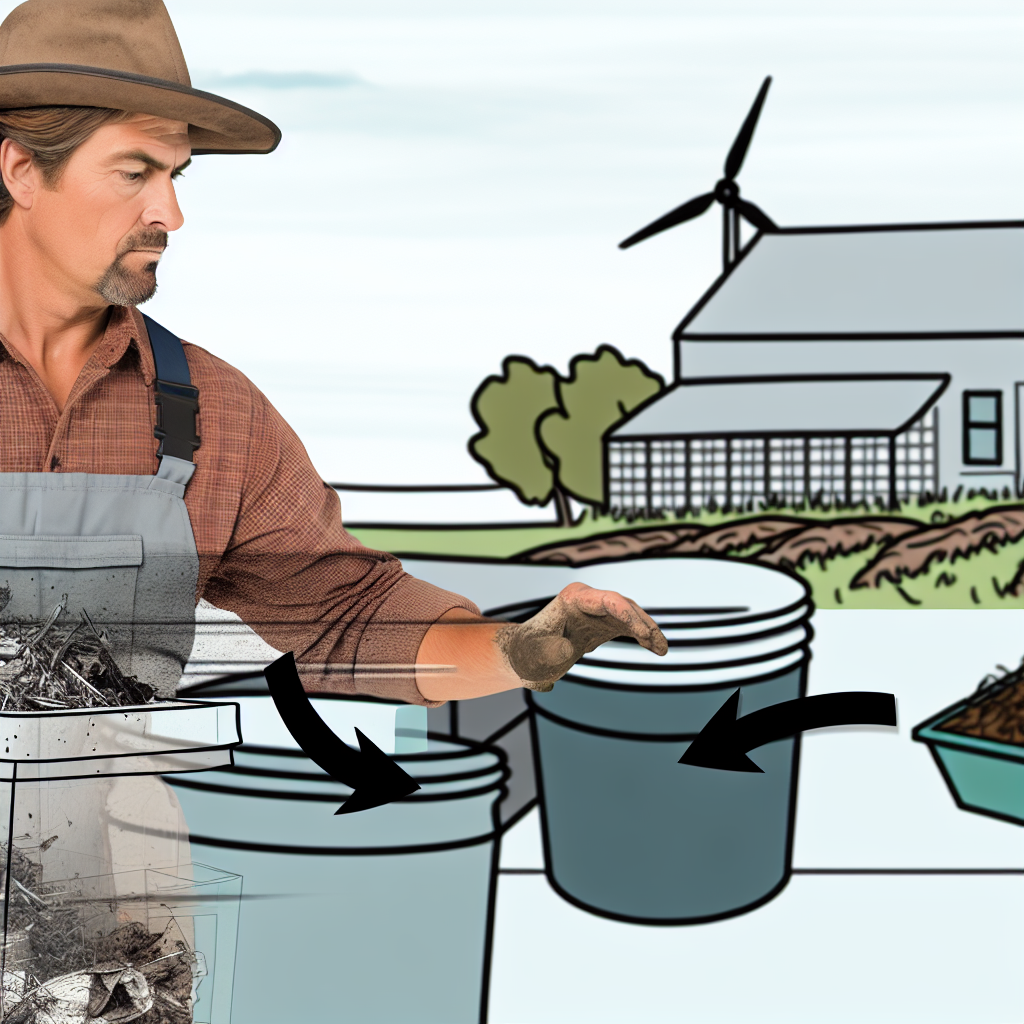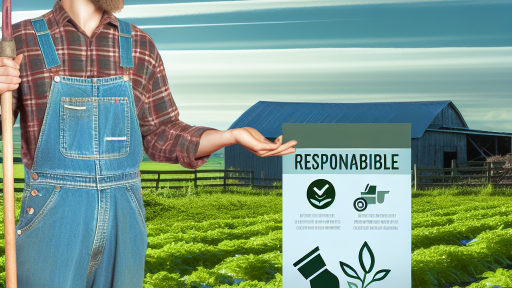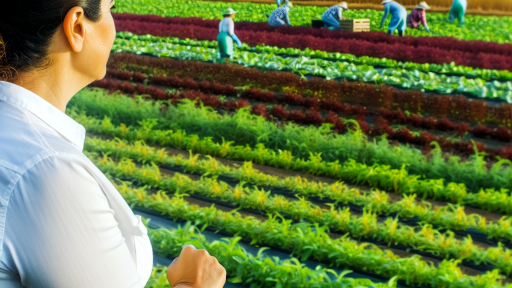Introduction to Farm Waste
Definition of Farm Waste
Farm waste refers to materials generated during agricultural activities.
This includes unused crop parts, livestock waste, and packaging materials.
Additionally, it can encompass pesticides and fertilizers that remain after application.
Farm waste management is essential for sustainable agriculture.
Statistics on Farm Waste
Globally, agriculture produces an estimated 1.3 billion tons of waste each year.
A significant portion of this waste ends up in landfills.
This contributes to greenhouse gas emissions and environmental pollution.
In the U.S. alone, around 63 million tons of agricultural waste is produced annually.
Additionally, nearly 30% of food produced is wasted during the supply chain.
These statistics highlight the urgent need for waste reduction strategies.
The Impact of Farm Waste
Farm waste negatively affects soil quality and crop yield.
Excessive waste can also lead to nutrient runoff into waterways.
This runoff can cause algal blooms, harming aquatic ecosystems.
Moreover, managing waste improperly can pose health risks to farmworkers.
Thus, reducing farm waste is crucial for both the environment and public health.
Transform Your Agribusiness
Unlock your farm's potential with expert advice tailored to your needs. Get actionable steps that drive real results.
Get StartedImpact of Farm Waste on the Environment and Economy
Environmental Consequences of Farm Waste
Farm waste significantly affects the environment.
It contributes to soil degradation and loss of fertility.
Moreover, improper waste disposal pollutes nearby water bodies.
This situation disrupts aquatic ecosystems and biodiversity.
Additionally, greenhouse gases from decomposing waste worsen climate change.
These emissions include methane and nitrous oxide.
Farm waste poses serious environmental risks.
Economic Implications of Farm Waste
Farm waste directly impacts agricultural productivity.
It leads to increased costs for farmers to manage waste.
Furthermore, wasted resources diminish overall farm profitability.
For example, unharvested crops represent lost revenue.
Consequently, the economy suffers due to reduced agricultural output.
In addition, inefficient waste management practices can inflate expenses.
Farmers may need to invest in advanced disposal technologies.
The economic burden of waste affects not just farms but communities.
Health Risks Associated with Farm Waste
Health risks arise from accumulated farm waste.
A variety of pathogens thrive in decaying waste materials.
These pathogens can contaminate food products and water supplies.
Consequently, exposure to contaminated resources can lead to illnesses.
Furthermore, chemical residues from agricultural waste pose additional dangers.
Proper waste management practices can mitigate these health risks.
Thus, addressing farm waste is essential for public health.
Sustainable Farming Practices
Overview of Sustainable Farming
Sustainable farming emphasizes practices that benefit both the environment and society.
This approach reduces waste and conserves resources while providing food security.
Showcase Your Farming Business
Publish your professional farming services profile on our blog for a one-time fee of $200 and reach a dedicated audience of farmers and agribusiness owners.
Publish Your ProfileFarmers prioritize crop rotation, organic farming, and integrated pest management.
These methods increase soil fertility and biodiversity on farms.
Benefits of Sustainable Farming
Sustainable farming enhances the natural ecosystem, promoting healthy plant and animal life.
It reduces greenhouse gas emissions significantly compared to conventional practices.
This approach decreases reliance on synthetic fertilizers and pesticides.
Farmers can achieve higher resilience to climate change through sustainable methods.
Economic Advantages
Sustainable practices lead to lower long-term operational costs.
They promote local economies by reducing dependence on imported goods.
Furthermore, many consumers prefer products from sustainable sources.
Contributions to Community Health
Sustainable farming improves the quality of food available to communities.
It encourages access to fresh produce, which benefits public health.
Additionally, sustainable farms often engage in community education programs.
Gain More Insights: Eco-Friendly Ethical Farming Strategies
Composting as a Method of Reducing Organic Waste
Understanding Composting
Composting involves the natural decomposition of organic materials.
It transforms food scraps and yard waste into nutrient-rich soil.
This process not only reduces waste but also enriches the soil.
Benefits of Composting
Composting offers numerous environmental benefits.
- It decreases the amount of waste in landfills.
- It lowers greenhouse gas emissions.
- It improves soil health and fertility.
- It enhances biodiversity in agricultural systems.
How to Start Composting
Starting a compost pile is simple and accessible.
Begin by choosing a suitable location in your yard.
Collect organic materials like vegetable scraps, grass clippings, and leaves.
Avoid adding meat, dairy, and oils to your compost.
Maintaining the Compost Pile
Turn the compost regularly to aerate it.
Keep the pile moist, but not too wet.
Monitor the temperature to ensure efficient decomposition.
Community Involvement
Engaging the community can enhance composting efforts.
Schools and local organizations can host composting workshops.
Creating community composting sites encourages broader participation.
Incentivizing Composting Practices
Local governments can promote composting through incentives.
Offering discounts on compost bins increases community adoption.
Educational programs can raise awareness of composting benefits.
See Related Content: Understanding CSA Subscription Models for Farms
Crop Rotation and Its Role in Minimizing Waste
Definition of Crop Rotation
Crop rotation involves systematically planting different crops in a specific sequence.
This practice enhances soil fertility and reduces pests.
Farmers can effectively manage crop yields using this method.
Benefits of Crop Rotation
One significant advantage is improved soil health.
Diverse crops contribute various nutrients to the soil.
Additionally, rotational practices lower the risk of soil erosion.
Farmers experience fewer pest and weed issues with this approach.
Reduction of Waste Through Crop Rotation
Crop rotation minimizes agricultural waste significantly.
It cuts down the need for chemical fertilizers.
Showcase Your Farming Business
Publish your professional farming services profile on our blog for a one-time fee of $200 and reach a dedicated audience of farmers and agribusiness owners.
Publish Your ProfileLess fertilizer means fewer chemicals entering the ecosystem.
Consequently, this leads to healthier surrounding environments.
Implementation Strategies
Farmers can implement crop rotation in various ways.
- Start with compatible crops that complement each other’s growth.
- Monitor soil health to select appropriate rotations.
- Educate farm workers on the benefits and logistics of crop rotation.
These strategies create a sustainable farming cycle.
Real-World Examples
A successful case study is found in the practices of Green Acres Farm.
They use a three-year rotation system with legumes, grains, and vegetables.
This strategy has increased their overall yield and reduced waste.
Moreover, it has enhanced soil health and reduced pest incidences.
Future Implications
As agriculture evolves, crop rotation will remain pivotal.
It offers a sustainable solution to the challenges of agricultural waste.
Farmers can adopt innovative crop combinations for enhanced efficiency.
This practice ultimately supports both environmental sustainability and food security.
Delve into the Subject: Local Food Systems And Sustainable Agriculture Growth
Utilizing Cover Crops to Enhance Soil Health and Reduce Waste
Benefits of Cover Crops
Cover crops play a vital role in enhancing soil health.
If you want to prevent soil erosion, cover crops protect the top layer of soil.
Moreover, they improve soil fertility through natural processes.
This leads to healthier plants and increased crop yields.
Types of Cover Crops
Various cover crops serve different purposes in farming.
Leguminous cover crops, such as clover, fix nitrogen in the soil.
Grasses, like rye, improve soil structure and prevent compaction.
Broadleaf plants boost organic matter content effectively.
Implementing Cover Crops
Farmers should choose cover crops based on specific needs.
Assessing the soil type and crop rotation schedule is crucial.
Timing the planting and termination of cover crops is essential.
This maximizes their benefits and minimizes waste effectively.
Long-Term Impacts
Utilizing cover crops leads to sustainable farming practices.
They enhance biodiversity by providing habitats for wildlife.
In addition, they help mitigate climate change effects.
Ultimately, cover crops contribute to a healthier ecosystem.
You Might Also Like: Tips for Successful Local Food Sourcing Initiatives

Innovative Technologies for Waste Reduction
Precision Agriculture
Precision agriculture uses technology to optimize field-level management.
This approach reduces waste by applying resources more efficiently.
Farmers can track crop health through advanced sensors and satellite imagery.
As a result, they make informed decisions on irrigation and fertilization.
This leads to significant reductions in overuse and waste of inputs.
Technological Tools
Farmers use GPS technology to improve field mapping.
This precision helps in identifying areas needing attention.
Additionally, drones monitor crop conditions from above.
With real-time data, farmers can act swiftly to mitigate waste.
- Soil sensors measure moisture and nutrient levels.
- Automated irrigation systems apply water as needed.
- Predictive analytics forecast yield and resource needs.
Data Management Systems
Collecting and analyzing data is crucial in precision agriculture.
Showcase Your Farming Business
Publish your professional farming services profile on our blog for a one-time fee of $200 and reach a dedicated audience of farmers and agribusiness owners.
Publish Your ProfileFarmers utilize software platforms to track operations and outputs.
These systems help identify patterns over time, leading to waste reduction.
Consequently, farms operate more sustainably and profitably.
Moreover, data-driven decisions enhance crop performance.
Environmental Benefits
Using precision techniques benefits the environment significantly.
Less fertilizer runoff improves water quality in nearby ecosystems.
Reduced pesticide use protects beneficial insects and wildlife.
This leads to healthier farmland and communities.
Ultimately, precision agriculture represents a step toward sustainable farming.
Case Studies of Farms Implementing Sustainable Waste Reduction Methods
Wholesome Valley Farm
Wholesome Valley Farm transformed food waste into compost effectively.
This farm partnered with local restaurants to collect their organic scraps.
In return, the farm provided fresh produce to these establishments.
The composting method enriched their soil, enhancing crop yield.
Consequently, they reduced waste disposal costs significantly.
Green Acres Organic Farm
Green Acres Organic Farm successfully implemented water conservation techniques.
They installed a rainwater harvesting system to collect runoff.
This system provides irrigation during dry seasons.
Additionally, they practice crop rotation to maintain soil health.
As a result, they minimized water usage and increased productivity.
Sunny Meadows Poultry Farm adopted integrated waste management strategies.
They utilized poultry litter as fertilizer for vegetable crops.
This practice reduces synthetic fertilizer dependence and improves soil quality.
As a supplementary benefit, they provide free-range options for consumers.
This strategy has led to increased customer loyalty and sales.
Harmony River Homestead
Harmony River Homestead embraced permaculture principles effectively.
They designed their farm layout to reduce waste and increase efficiency.
A key initiative involves planting multi-crop systems that enhance biodiversity.
These systems support natural pest control and reduce chemical use.
Moreover, they have established a community-supported agriculture program.
This program educates the public about sustainable practices while reducing food waste.
Mountain View Vineyard
Mountain View Vineyard innovated by recycling grape pomace into natural fertilizers.
This process minimizes waste generated during winemaking.
Additionally, they conduct workshops on sustainable farming practices.
These workshops help local farmers adopt eco-friendly methods.
Consequently, they have built a strong community network committed to sustainability.
Government Policies and Initiatives Supporting Waste Reduction in Farming
Overview of Existing Policies
Governments worldwide recognize the importance of reducing farm waste.
These policies aim to enhance sustainability in agricultural practices.
They include regulations that promote recycling and composting.
Additionally, initiatives offer financial incentives for adopting sustainable methods.
Regional Support Programs
Many regions implement support programs to boost sustainable farming.
Showcase Your Farming Business
Publish your professional farming services profile on our blog for a one-time fee of $200 and reach a dedicated audience of farmers and agribusiness owners.
Publish Your ProfileFor instance, California’s Healthy Soils Program provides funding for soil health projects.
This program helps farmers adopt practices that reduce waste.
Similarly, the European Union’s Common Agricultural Policy promotes eco-friendly farming practices.
Research and Development Funding
Government grants and funding opportunities support agricultural research.
These funds enable innovations that reduce waste on farms.
Research institutions collaborate with farmers to develop new technologies.
Such technologies can efficiently manage resources and reduce byproducts.
Public Awareness Campaigns
Governments also conduct public awareness campaigns on sustainable practices.
These campaigns educate farmers about the benefits of waste reduction.
Moreover, they provide guidance on how to implement sustainable methods.
By raising awareness, these efforts encourage responsible farming behavior.
Collaboration with Industry Groups
Collaboration between governments and industry groups is vital.
These partnerships create platforms for sharing best practices.
They also facilitate the exchange of resources and knowledge.
As a result, farmers gain access to effective waste reduction strategies.
Future Directions
Looking forward, government policies must evolve continually.
They should address emerging challenges in waste management.
Additionally, fostering innovation will be crucial for future sustainability efforts.
Ultimately, robust policies can significantly reduce farm waste.
Future Trends in Sustainable Farming Practices and Waste Management
Innovative Farming Techniques
Agriculture is evolving with new technologies.
Farmers adopt precision agriculture methods.
These techniques use data to optimize crop production.
Furthermore, vertical farming continues to gain traction.
This method maximizes space and minimizes land use.
Waste Reduction Initiatives
Reducing landfill waste is a primary focus.
Farmers implement composting systems for organic waste.
Additionally, anaerobic digestion converts waste into energy.
This process reduces methane emissions and generates power.
Crop Rotation and Diversity
Crop rotation enhances soil health and fertility.
Diversifying crops also mitigates pest infestations.
This approach decreases the need for chemical pesticides.
Moreover, it promotes a sustainable ecosystem on farms.
Policy and Community Engagement
Government policies support sustainable practices.
Financial incentives encourage farmers to adopt eco-friendly methods.
Community programs build awareness on waste management.
Farmers collaborate with local organizations for better resources.
Emphasis on Consumer Awareness
Consumer preferences influence farming practices.
People increasingly demand sustainably sourced products.
This trend encourages farms to shift toward organic cultivation.
In turn, it minimizes overall waste production.
Showcase Your Farming Business
Publish your professional farming services profile on our blog for a one-time fee of $200 and reach a dedicated audience of farmers and agribusiness owners.
Publish Your ProfileAdditional Resources
Food Miles: Background and Marketing – ATTRA – Sustainable …
The Farm to Table Movement- It’s a Whole New Way of Eating.
[E-Books for Sale]
500 Farming Tax Laws Simplified: The Ultimate Global Guide for Farmers
$19.99 • 500 Farming Tax Laws • 154 pages
Maximize your farm’s savings with 500 simplified tax laws, tips, and strategies in this essential farmer’s guide!
See All 500 Farming Tax Laws of this E-Book
2,000 Technological Solutions to Revolutionize Your Agribusiness: A Comprehensive Global Guide for Farmers
$19.99 • 2,000 Technological Solutions • 343 pages
Discover 2,000 cutting-edge technologies to transform your agribusiness. Boost productivity and sustainability today!




